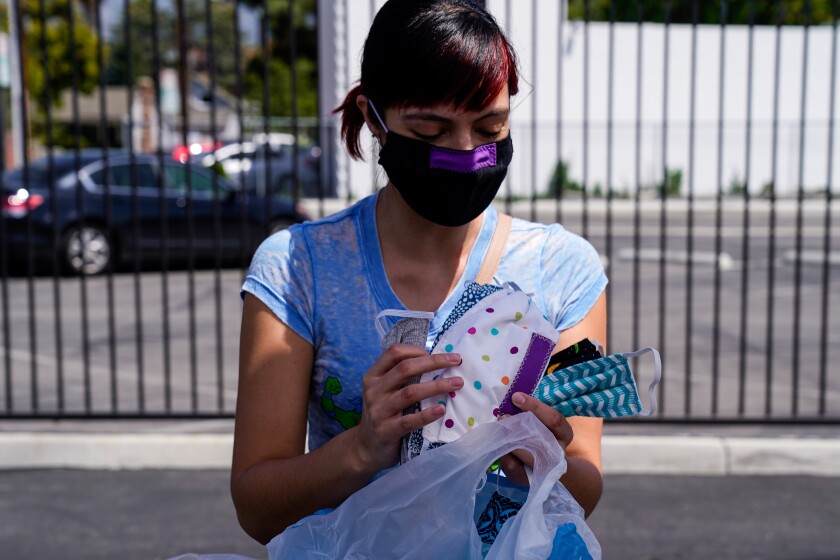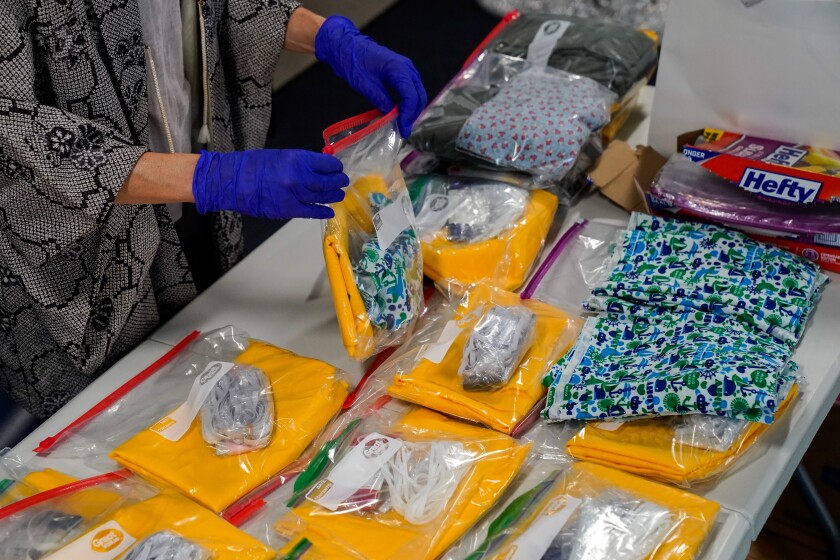Coronavirus turned these costumers into Hollywood’s ‘mask crusaders’
Nickolaus Brown, president of Motion Picture Costumers IATSE Local 705, makes face masks at his home in Hollywood.
(Kent Nishimura / Los Angeles Times)
Like many of his colleagues in Hollywood, costumer Nickolaus Brown felt helpless when the COVID-19 pandemic struck.
He had been working on Netflix’s big-budget action movie “Red Notice,” making sure Dwayne Johnson’s clothes fit right on set in Atlanta, before filming was shut down.
The crisis hit home for Brown, president of the Motion Picture Costumers Local 705. His sister, a nurse in Winston-Salem, N.C., had sent him a photo of her son waving goodbye to his dad through a window — a necessary physical separation because her radiologist husband was exposed to COVID-19 at work. Medical providers, she said, faced a severe shortage of masks and other protective equipment.
Brown was determined to do something. So he took to Facebook and put out a “call to arms,” rallying 250 designers, sewers and cutters to make masks for healthcare providers and others.
“It breaks my heart,”Brown said, his voice breaking in a phone interview from his home in Los Angeles. “So I have a personal reason for doing this as well.”
The motion picture industry has been decimated by the coronavirus crisis, which has halted film and television productions worldwide. More than 100,000 cast and crew have lost work and are turning to relief packages set up by unions, independent Go Fund Me efforts and various Hollywood foundations.
With no end in sight to the crisis, costumers — whose job is to create and fit costumes for actors on sets — are plying their sewing and design skills to help address the very real shortages of face masks and other protective clothing among medical workers.
Eileen DenAdel, in the Burbank parking lot of the Costume Designers Guild, holds masks she made that will be delivered to medical workers. (Kent Nishimura / Los Angeles Times)
“Nobody is working right now, so everybody needs a purpose; everybody needs something positive to focus on,” Brown said. “We have the skills and the talents to make this happen.”
Brown’s local and others within the International Alliance of Theatrical Stage Employees union have mobilized an army of costume and wardrobe workers to fashion face masks from donated fabric and other materials. L.A.-based costumers already have produced 3,500 to 4,000 cloth masks for healthcare providers, the union estimates.
And they have been working with UCLA to create a higher-quality medical-grade prototype that their sewers can make quickly and in large numbers.
“IATSE has been functioning as a true partner to UCLA Health during our crisis response efforts,” Becky Mancuso-Winding, executive director of strategic community and business relations at UCLA Health, said in a statement.
Brown wasn’t alone in his desire to help. After 15 years as a costume designer, Lauren Oppelt was about to try her hand at directing her first short film when the pandemic came.
With time on her hands, she had noticed from the various sewing groups she belonged to that some people had already started making masks.
“I don’t have anything else to do,” the Los Feliz-based designer thought. So she made a mask and posted a picture of it on Instagram. Requests for more masks came flooding in.
One came from a childhood friend, an ER doctor in San Francisco, telling her of the urgent need for masks and other personal protective equipment.
She launched a group called “Mask Crusaders”, which now has about 100 members. The group includes sewers, “runners” who gather fabric, and volunteers who collect donations of money and materials. She then teamed up with the Costume Designers Guild (Local 892) to help deliver the masks.
“We are not running out of places to send them to,” Oppelt said. “I didn’t know what an N95 was two weeks ago.”
Oppelt says she gets requests from all over the country asking for masks, and only sends to hospitals. So far, masks and sewing supplies have been delivered to hospitals in multiple states, including California, Louisiana, Rhode Island, Florida, Kentucky and Georgia.
Salette Corpuz of the Costume Designers Guild assembles kits in Burbank to be disseminated for making face masks.
(Kent Nishimura/Kent Nishimura/Los Angeles Times)
Working from their homes, huddled over sewing machines, Oppelt and her colleagues have been adapting various patterns found on the internet and researching different scientific studies to find the best materials to limit the transmission of the virus.
The makeshift masks produced by Oppelt and others are designed to wear over the regulation N95 respirators medical providers use, as an additional layer of protection. A filter can also be attached to the donated masks, which have a roughly 70% efficacy rate at blocking small particles, said Oppelt, who wrote a Medium post about her mask-making.
Most of the masks have been made from poly-cotton jersey knit fabric, but there are better materials, such as polypropylene, that the costumers are trying to get their hands on.
“We are working to develop things with higher efficacy rates,” Oppelt said. “We are trying to get polypropylene, and using air conditioner filters, we are innovating as much as we can, but we are also inundated. By the end of next week, we will have sent out 10,000 masks.”
Another key member of the team is costume manufacturing foreperson Marilyn Madsen, who was about to start working on a secret Marvel project before the outbreak. She has been confined to her home in Altadena since she returned from a Scandinavian cruise last month, just before the U.S. banned travel to much of Europe.
Madsen has been testing various materials and patterns to develop more effective mask prototypes.
“It’s like how we do with Marvel,” Madsen said. “We made eight pairs of pants for Thor before it was Thor’s pants.”
Although most hospitals won’t accept or distribute to their staff handmade masks from the public, medics have been ordering masks from costumers as back-ups, or simply to cover their N95 masks, which they may need to reuse.
“I am exposed as much as you can be,” Nicolas Sawyer, a Sacramento-based emergency room physician, told the Los Angeles Times. His work involves supervising the intubation of patients who may be infected with COVID-19. During this high-risk procedure, hospital staff wear battery-operated ventilators called PAPRs, and he said there was no expectation of a shortage of that equipment.
But the rest of his day, he relies on traditional surgical masks, and on the off-chance they run out, he recently requested 100 masks from the costume designers.
Although the health system he works for is doing its best to protect staff, “the problem is on the supply side.” Sawyer is fashioning an insert for the mask from home air-conditioner filters.
“We are allowed to wear them at our discretion,” Sawyer said. “I’ve been wearing a surgical mask at work because I touch my face; it’s part of being human. It is helpful and preventable in terms of me not touching my face. If we run out of surgical masks, I’m going to say I have these masks,” said Sawyer, who acknowledged they offered limited protection against the virus. “But they will stop me from touching my face.”
Whether medics will widely use the costumers’ masks, the drive is giving these sewers and designers without a cast to fit a sense of purpose.
“A lot of members are very concerned, like everybody is in the country, with their financial well-being,” Brown said. “People are worried about making mortgage payments and paying their rent and having the basic necessities. Having this project gives them something to block out the reality of what’s happening.”
This article was first published here.



